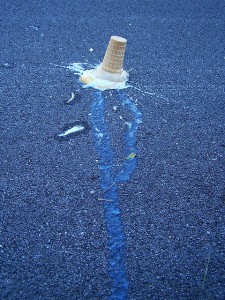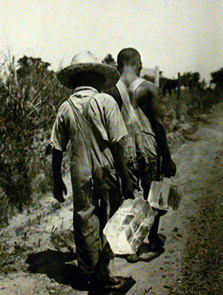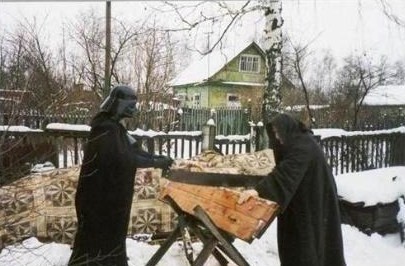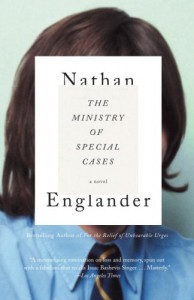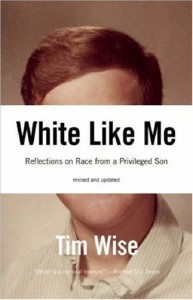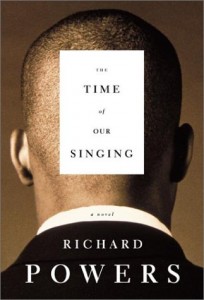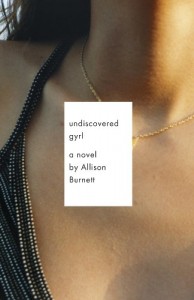PW Under-rated writers list
In response to the Huffington Post’s over-rated writers list, PW makes an under-rated writers list. On Jesus Angel Garcia‘s FB page, there’s a discussion going on exactly what makes a writer under-rated. I mean, come on: Tao Lin is on the list, along with the likes of Deborah Eisenberg (a Guggenheim fellowship, three O’Henry’s, a MacArthur, etc.), Mary Gaitskill (been in Nyer, Harper’s, Esquire, etc), and Donald Antrim (finalist for a PEN/Faulker, frequent NYer contributor, etc), all writers I would say have received ample attention. If this is what it takes to be under-rated, what does someone have to do to be over-rated? (Don’t answer that. I already know the answer: be Jonathan Safron Foer or Junot Diaz.) To be fair, there are also some truly under-rated writers on their list. What do you think?
It is Friday: Go Right Ahead
At the table inquire, “Anyone not for beer?”
Throw yourself about, do imitations, maybe even fight a little
x drinks drunk in y moments are more potent than x drinks drunk in 2y moments
He resolved, having done it once, never to move his eyeballs again
At least a hangover is the truth

Put a broad hand on the beer-engine!
Sometimes being a friend means mastering the art of timing
Have some bitter and go to the prom
Being drunk is one big ellipsis
Mayonnaise will remove stains
Some of Poe’s tales convey perfectly the idea of a hangover
I am a flashy dresser and I shout a lot!
I should stop, but it is OK to get drunk if a certain thing goes wrong. It has. So here I go
Splat in the Memory
This happened to my daughter, who is under 2, two weeks ago. She is still talking about it: “I-cream fell. I-cream. FELL. I. Cream. ISE. FELL.” When she wakes up, it’s one of the first things she says, and repeats, as though she’d relived the experience during her sleep. If something else falls, she mentions the ice cream fall again. It has become Something in her mind, an event, perhaps a trauma, certainly a point of reference. An image that has stayed.
It has been asked before, but it’s worthwhile to re-up: what is one image from a book that has become indelible in your mind?
And here’s the B-Side: do we put too much importance on “the memorable image,” or “memorability” in general, with regard to the books we read? Are the ones that stay with us automatically “better”? Because I’ve read plenty of books that have absorbed me fully in the reading, in the moment, but that seem to vaporize as soon as I’m done. Are such works somehow inferior? Which ones are you more likely to re-read, the ones that you remember, or the ones that you don’t? Is re-read value adequate for determining a book’s worth?
On (Not?) Taking For Granted
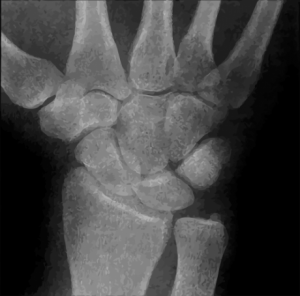 Turn a key. Empty an ice cube tray. Open a bottle. Hit a forehand. These are actions I took, as the saying goes, for granted. But for the past month I haven’t been able to do those things because of a very painful injury of my right (dominant) wrist. Neither my twice-weekly physical therapist nor my orthopedist can tell me when it might heal; until the pain goes away, the treatment is immobilization, ice, anti-inflammatories, splint, and 14-hour battery patches that pulse medicine into my tendons. No tennis, no piano, no gardening. Driving, cleaning self and home, typing and hand-writing are necessary but very uncomfortable and clumsy.
Turn a key. Empty an ice cube tray. Open a bottle. Hit a forehand. These are actions I took, as the saying goes, for granted. But for the past month I haven’t been able to do those things because of a very painful injury of my right (dominant) wrist. Neither my twice-weekly physical therapist nor my orthopedist can tell me when it might heal; until the pain goes away, the treatment is immobilization, ice, anti-inflammatories, splint, and 14-hour battery patches that pulse medicine into my tendons. No tennis, no piano, no gardening. Driving, cleaning self and home, typing and hand-writing are necessary but very uncomfortable and clumsy.
It could be worse. Is worse, for so many. This is, presumably, temporary, and everything else about my body and my life is fine.
I was all geared up for an active, healthy, productive summer. I moved from a 5th-story loft to a house, close to the ground, apt to fly out of the door at any moment to participate in some active, healthy, productive activity. And write. I would write so much!
Here’s some poetic injustice: all those active, healthy, productive activities are now impossible or painful, whereas most kinds of indulgence and debauchery are totally doable. I can’t chop up vegetables, but I can fry up chicken or order pizza. I can sit at a bar and drink alcohol. I can have most kinds of consensual sex. I can get a pedicure. I can watch tv and order shiny objects from websites.
Just before my injury, I was newly liberated from a fraught romantic entanglement and ready to move into the new place. Free! Independent! I gamely packed and lifted boxes by myself since my romantic entangler was not around to help as planned. And that’s how I injured my wrist. Lifting boxes. Exercise in self-sufficiency: fail.
Hard work and self-reliance not only didn’t pay off but also became nigh impossible. Taking all those activities for granted didn’t cause my injury and giving thanks wouldn’t have prevented it. I take plenty for granted now, and I’ll take everything for granted again. Those things WERE granted to me, until they weren’t.
We’re told not to take things for granted. This is misguided. Plenty is just granted to us, good or bad. If anything, we should take more for granted. Not everything operates under our locus of control. Sometimes we do the right things and get hurt. Sometimes we can’t do anything to make ourselves better. We just have to wait, do nothing productive, indulge ourselves for awhile. Recognizing that we are not autonomous–that is liberating.
The Language of Summer: A Photo Journey
1. 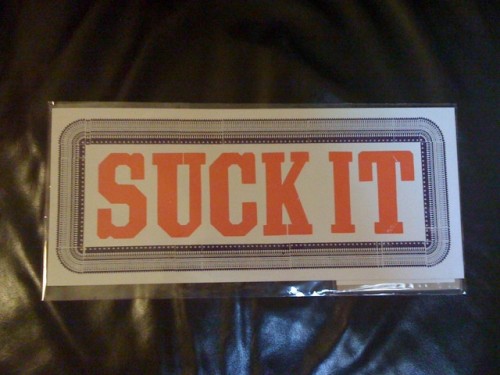
I’ve just been road-tripping and hiking for a week around parts of the South I somehow missed as a kid growing up…in the freaking South. I was struck by the shards of interesting (inter-sting) language I came across. There was the odd sign that read “Paches” instead of “Peaches,” and the randomly hyphenated “To-day” along winding country roads, but also the above wonderfully descriptive poster from Yee-Haw Industries in Knoxville, TN (and also online here). They have great stuff, and their shop is 90% letterpress studio with only a storefront sliver of retail space.
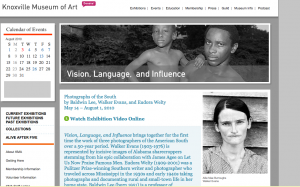 2. The Knoxville Museum of Art had a fabulous exhibition called Vision, Language, and Influence: Photographs of the South by Baldwin Lee, Walker Evans, and Eudora Welty. Great stuff. Some photos from the now-closed exhibition are here. I didn’t know Welty was also a photographer, but I discovered in her photos a wonderful sense of composition, a writerly eye, if you will, creating character and mood and narrative in one shot. The dean of the library I work in uses the phrase One Stop Shopping. I like that for the feeling of completeness I get from her photos.
2. The Knoxville Museum of Art had a fabulous exhibition called Vision, Language, and Influence: Photographs of the South by Baldwin Lee, Walker Evans, and Eudora Welty. Great stuff. Some photos from the now-closed exhibition are here. I didn’t know Welty was also a photographer, but I discovered in her photos a wonderful sense of composition, a writerly eye, if you will, creating character and mood and narrative in one shot. The dean of the library I work in uses the phrase One Stop Shopping. I like that for the feeling of completeness I get from her photos.
Here’s one that I loved:
3. Have you ever been to Gatlinburg, TN? What a redneck Disney World. Some t-shirts from a storefront in Gatlinburg:
Dick in a box
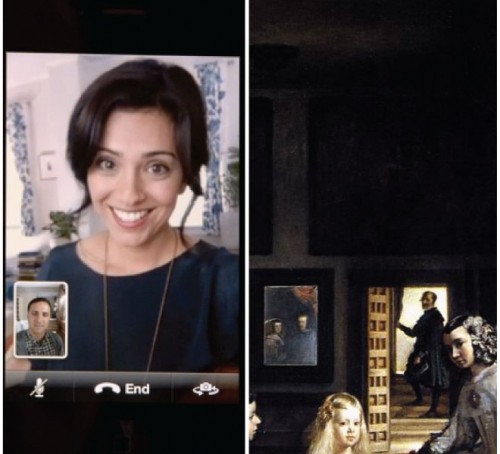
With the new iPhone’s video chat, a second built-in camera faces the user, whose image is shown in the interface as a kind of tiny self-portrait. Of the many narratives instilled in their recent advertising campaign, a women tells her husband that she’s expecting (expectation being Apple’s entire marketing ethos). We the consumer become the husband, experiencing a half-life of their fantasy. In the ad, a perfect hand holds the phone — a model’s, though we accept it as the husband’s, faithful of the narrative.
It is Friday: Go Right Ahead
Damn the men with careful smiles
My head is a jug
Alcoholic philanthropy is still philanthropy
OK I got drunk and forgot I was giving a party
Killed 9 bottles
She got drunk and turned on me like a fish-wife
Summer is not a season, it’s an occupation
Every compulsion is put upon writers to become safe, polite, obedient, and sterile
Drink is a rebellion
I’m just happy to be here
Go ahead, talk out your hat
Mussed again, your hair
Agile tongue, thickened
In Praise of Sorta/Not-Very-Intellectual Fatties
 When I was about 5, my mother started reading the first installment in The Boxcar Children to me. She got to the end of chapter one and asked if I wanted her to continue. I could not believe my luck: this story, these characters, lived on in the following chapter. I was accustomed to picture books, wherein the narrative concludes after 15 pages or so. Any big books I may have had were probably anthologies of similar stories, fairy tales or fables or the like. That there were all these bigger longer stories was the most awesome childhood discovery. That The Boxcar Children was a whole series of such books, well, hell’s bells.
When I was about 5, my mother started reading the first installment in The Boxcar Children to me. She got to the end of chapter one and asked if I wanted her to continue. I could not believe my luck: this story, these characters, lived on in the following chapter. I was accustomed to picture books, wherein the narrative concludes after 15 pages or so. Any big books I may have had were probably anthologies of similar stories, fairy tales or fables or the like. That there were all these bigger longer stories was the most awesome childhood discovery. That The Boxcar Children was a whole series of such books, well, hell’s bells.
This began as a comment to Catherine’s post this morning, but then I felt like I was talking about something kind of different, so I decided to devote a post. Catherine coined the term “intellectual fatties” to describe long, abstruse novels that she gets no joy from reading. Presumably, the longer a difficult book is, the harder it is to get through, which is why she limited the field as to length. This got me to thinking about books that are long, but only regularly difficult. I don’t, to my knowledge, read many very difficult books of any length, so I can’t speak as to that.
The longest books I’ve finished are Moby Dick, War and Peace, A Suitable Boy, Les Miserables, lots of big Dickens. None of these are terribly difficult intellectually, but in all cases the experience was joyous. Longer is not harder to get through, in my experience. It’s actually much easier to read one 1200 page book, intellectually, than to read 4 books of 300 pages. In the latter case, you have to get accustomed to 4 different worlds, 4 different voices, so many more characters. In the first case, you only acclimatize one time, and then you are sailing. And you get to know those characters so much better, and you become fluent in the sound and the rhythms of the prose. After finishing The Pickwick Papers, the first 150 pages of which are dreck, I missed Sam Weller the way I miss good friends in absentia.
Whenever I teach a book to my students, I assign the first 30 or so pages, talk about those, and then assign increasingly larger sections for the duration of the novel. This isn’t just because beginnings are so important; it’s because starting a novel, and learning to navigate its terrain, is the hardest part, and I want to spend a lot of time helping them with that.
While I don’t have any hard numbers to back this up, I’m pretty sure that most of the books I’ve not finished (but have read at least, say, 40 pages of) come in under 200 pages. Don’t know why, really, but perhaps it’s because the investment doesn’t seem worth it, if I’m not pretty immediately delighted by it. Once I get into it, it’ll just be over. That’s no fun.
I prefer television shows to movies for the same reason. If I’ve signed up to immerse myself another person’s vision of things, I don’t want to be hauled ashore after just 2 or 3 hours.


